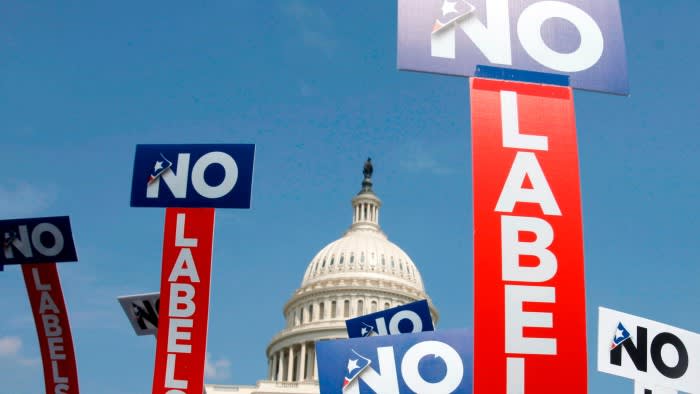Unlock the Editor’s Digest for free
Roula Khalaf, Editor of the FT, selects her favourite stories in this weekly newsletter.
No Labels, the bipartisan group that had aimed to field an independent “unity ticket” in the 2024 presidential contest, has scrapped its bid, removing a threat to Joe Biden’s re-election campaign.
The decision came after No Labels failed to find a candidate to head its presidential ticket.
“No Labels has always said we would only offer our ballot line to a ticket if we could identify candidates with a credible path to winning the White House. No such candidates emerged, so the responsible course of action is for us to stand down,” the group said on Thursday.
The announcement will be a relief to Democrats who worried a centrist ticket would siphon votes away from President Biden and help Donald Trump in swing states that could decide the election.
No Labels approached many potential candidates, including former Maryland governor Larry Hogan, a Republican who has since announced a run for the US Senate, and Joe Manchin, the Democratic senator from West Virginia.
Former New Jersey governor Chris Christie, a Republican who twice ran for president and is among the party’s most high-profile critics of Trump, also declined to join a No Labels ticket last week.
The rejections from recognisable names left the group with candidates enjoying little national profile, said John Mark Hansen, a professor in the University of Chicago’s political science department. “So if you [were] interested in running on the No Labels platform, it means that you lost — you’re an unsuccessful candidate.”
Anti-Trump group The Lincoln Project said No Labels was “a dark money operation created to throw the election to Trump . . . and failed”.
Centrist Democratic think-tank Third Way said it was “deeply relieved” that the group have failed to find a candidate. “While the threat of third-party spoilers remains, this uniquely damaging attack on President Biden and Democrats from the centre has at last ended.”
Investor Craig Duchossois, a No Labels donor, told the Financial Times he would not give to Trump or Biden but would give even more to Republican congressional candidates. He has given millions to help Republicans keep the House and take back the Senate.
“We are all very disappointed,” Duchossois said. “My money will be headed to the Senate and the House!”
The collapse of the group’s presidential plan comes after its founding chair, former US senator and Democratic vice-presidential candidate Joe Lieberman, died last week.
Although independent and third-party candidates have little hope of winning the US presidency, they can still pull votes from Democratic and Republican nominees, tipping the scales in tight contests.
Independent candidates are polling at a combined 14.2 per cent in national polls, with former president Trump leading on 42 per cent and Biden on 40 per cent.
Robert F Kennedy Jr, the most popular independent candidate, has more than 10.5 per cent, while Cornel West and Jill Stein are each on about 2 per cent, according to a RealClearPolitics average.
Democrats have been more concerned about third-party bids than Republicans, with Kennedy seen as the biggest threat. In Michigan and Pennsylvania, two pivotal battleground states, Kennedy received the support of about 15 per cent of registered voters, while Trump narrowly led Biden overall, in mid-March CNN polls.
The Democratic National Committee said it had established a team dedicated to quashing independent presidential bids.
“We’re just not going to take anything for granted this election cycle,” said DNC spokesperson Matthew Corridoni.

Emily Foster is a globe-trotting journalist based in the UK. Her articles offer readers a global perspective on international events, exploring complex geopolitical issues and providing a nuanced view of the world’s most pressing challenges.








